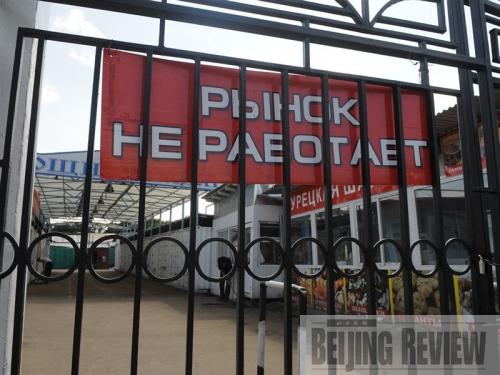|
 |
|
SHUTDOWN: A sign reading "market closed" hangs at the entrance of the Cherkizovsky Market in Moscow at the end of June. The closure caused massive economic losses for Chinese business people in Russia (CHINA.ORG.CN) |
In June, without warning, Russian officials shuttered the Cherkizovsky Market in Moscow. The closure caused not only massive economic losses for Chinese businessmen across Russia, but also jeopardized bilateral trade between the two powers. So why did Russia insist on closing the market—and keeping it closed? How will the shutdown influence merchants and consumers on each side? And where will the bilateral non-governmental trade go?
The closure
The exact reason the Russians shut down the Cherkizovsky Market is complicated. Seemingly, it is a government action against something called "gray customs clearance."
For one thing, gray customs clearance has existed in Russia for nearly 20 years—and has led to considerable losses of tariffs in the past. Since 2008, though, the Russian economy has suffered greatly from the global financial crisis, coupled with the steep fall in oil prices. Under these conditions, the Russian Government has resorted to cracking down on gray customs clearance once again.
Gray customs clearance, more specifically, is a non-standard form of trade, and can be traced back to the early 1990s—during Moscow's most difficult stage of economic transition, amid serious shortages of daily necessities for its people.
During Russia's reform of trade liberalization policies since then, goods flooded in from a number of other countries, including China. To protect its domestic light industry, Russia responded by imposing heavy taxes on these imports, while implementing lengthy and tedious customs clearance procedures on foreign goods.
Against this backdrop, Russia's State Customs Committee accepted the irregular behavior by some of its less transparent clearance companies, allowing them needed legal formalities, including declaring at customs, paying taxes and taking commodity inspection for their consignors.
| 